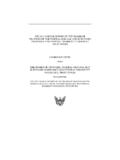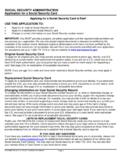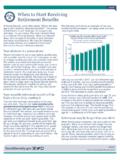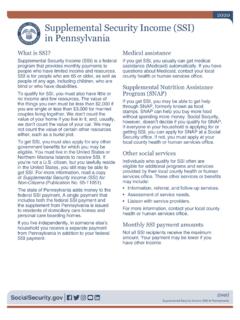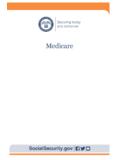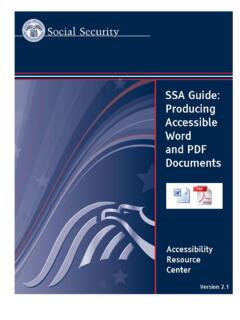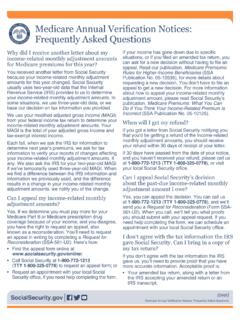Transcription of Links Between Early Retirement and Mortality
1 ORES working paper SeriesNumber 93 Links Between Early Retirement and MortalityHilary Waldron*Division of Economic ResearchAugust 2001 social security AdministrationOffice of PolicyOffice of Research, Evaluation, and Statistics* social security administration , Office of Policy8th Floor, ITC Building, 500 E Street SW, Washington, DC 20254-0001 working Papers in this series are preliminary materials circulated for review andcomment. The views expressed are the author s and do not necessarily represent theposition of the social security In this paper I use the 1973 cross-sectional Current Population Survey (CPS) matched tolongitudinal social security administrative data (through 1998)
2 To examine therelationship Between Retirement age and Mortality for men who have lived to at least age65 by year 1997 or Logistic regression results indicate that controlling forcurrent age, year of birth, education, marital status in 1973, and race, men who retireearly die sooner than men who retire at age 65 or older. A positive correlation betweenage of Retirement and life expectancy may suggest that Retirement age is correlated withhealth in the 1973 CPS; however, the 1973 CPS data do not provide the ability to test thathypothesis results also indicate that the composition of the Early retirementvariable matters.
3 I represent Early retirees by four dummy variables representing age ofentitlement to social security benefits exactly age 62 to less than 62 years and 3months (referred to as exactly age 62 in this paper ), age 62 and 3 months to 62 and 11months, age 63, and age 64. The reference variable is men taking benefits at age 65 orolder. I find that men taking benefits at exactly age 62 have higher Mortality risk thanmen taking benefits in any of the other four age groups. I also find that men takingbenefits at age 62 and 3 months to 62 and 11 months, age 63, and age 64 have highermortality risk than men taking benefits at age 65 or older.
4 Estimates of Mortality risk for Early retirees are lowered when higher-risk age 62 retirees are combined with age 63and age 64 retirees and when age 62 retirees are compared with a reference variable ofage 63 and older retirees. Econometric models may benefit by classifying Early retireesby single year of Retirement age or at least separating age 62 retirees from age 63 and2age 64 retirees and age 63 and age 64 retirees from age 65 and older retirees if single-year breakdowns are not possible. The differential Mortality literature clearly indicates that Mortality risk is higherfor low-educated males relative to high-educated males.
5 If low-educated males tend toretire Early in relatively greater numbers than high-educated males, higher Mortality riskfor such individuals due to low educational attainment would be added to the highermortality risk I find for Early retirees relative to that for normal retirees. Descriptivestatistics for the 1973 CPS show that a greater proportion of age 65 retirees are collegeeducated than age 62 retirees. In addition, a greater proportion of age 64 retirees arecollege educated than age 62 retirees, and a lesser proportion of age 64 retirees arecollege educated than age 65 or older retirees.
6 Age 63 retirees are only slightly moreeducated than age 62 a trend toward Early Retirement over the birth cohorts in the 1973 CPS, Ido not find a change in Retirement age differentials over time. However, I do find achange in Mortality risk by education over time. Such a change may result from thechanging proportion of individuals in each education category over time, a trend towardincreasing Mortality differentials by socioeconomic status, or a combination of the two. This paper does not directly explore why a positive correlation betweenretirement age and survival probability exists.
7 One possibility is that men who retireearly are relatively less healthy than men who retire later and that these poorer healthcharacteristics lead to earlier deaths. One can interpret this hypothesis with a quasi-disability explanation and a benefit optimization explanation. Links Between these3interpretations and my analysis of the 1973 CPS are fairly speculative because I do nothave the appropriate variables needed to test these quasi-disability explanation, following Kingson (1982), Packard (1985), andLeonesio, Vaughan, and Wixon (2000), could be that a subgroup of workers who chooseto take retired-worker benefits at age 62 is significantly less healthy than other workersbut unable to qualify for disabled-worker benefits.
8 An econometric model with a mix ofboth these borderline individuals and healthy individuals retiring at age 62 and withalmost no borderline individuals retiring at age 65 could lead to a positive correlationbetween Retirement and Mortality , even if a greater percentage of individuals who retire atage 62 are healthy than unhealthy. Evidence for this hypothesis can be inferred from thefinding that retiring at exactly age 62 increases the odds of dying in a unit age interval by12 percent relative to men retiring at 62 and 3 months to 62 and 11 months for men in the1973 CPS.
9 In addition, retiring exactly at age 62 increases the odds of dying by23 percent relative to men retiring at age 63 and by 24 percent relative to men retiring atage 64. A group with relatively severe health problems waiting for their 62nd birthday totake benefits could create this result. An explanation based on benefit optimization follows Hurd and McGarry sresearch (1995, 1997) in which they find that individuals subjective survivalprobabilities roughly predict actual survival. If men in the 1973 CPS choose age ofbenefit receipt based on expectations of their own life expectancy, then perhaps a positivecorrelation Between age of Retirement and life expectancy implies that their expectationsare correct on average.
10 If actuarial reductions for Retirement before the normal retirementage are linked to average life expectancy and an individual s life expectancy is below4average, it may be rational for that individual to retire before the normal Retirement for this hypothesis can be inferred from the fact that men retiring at age 62 and3 months to age 62 and 11 months, age 63, and age 64 all experience greater mortalityrisk than men retiring at age 65 or older. If only men with severe health problems whoare unable to qualify for disability benefits are driving the results, we probably would notexpect to see this result.
